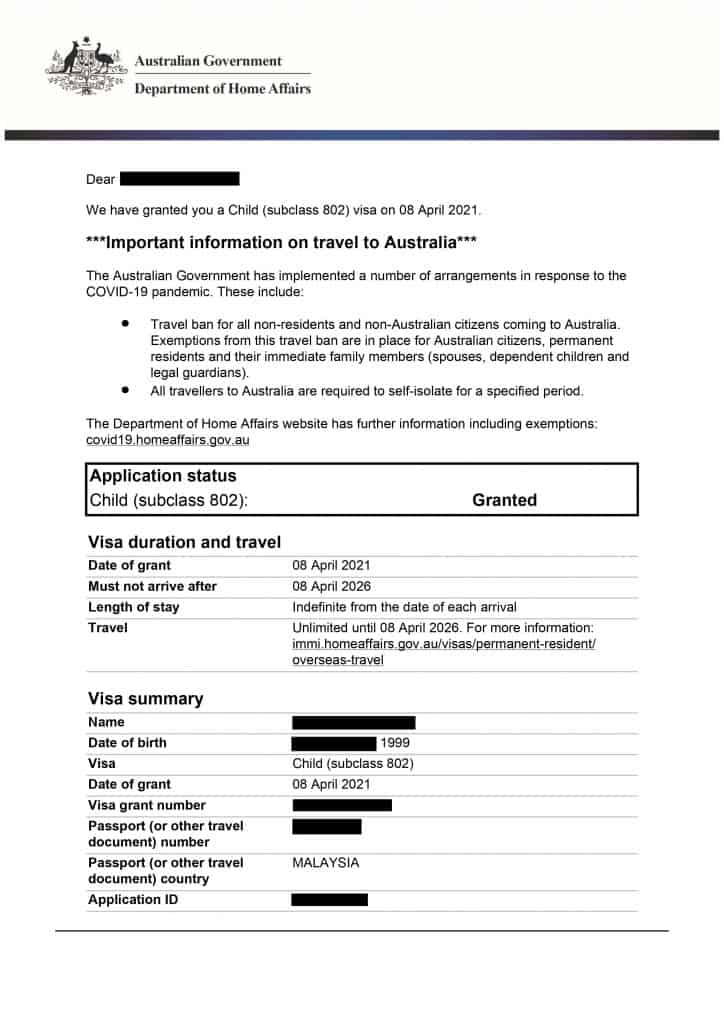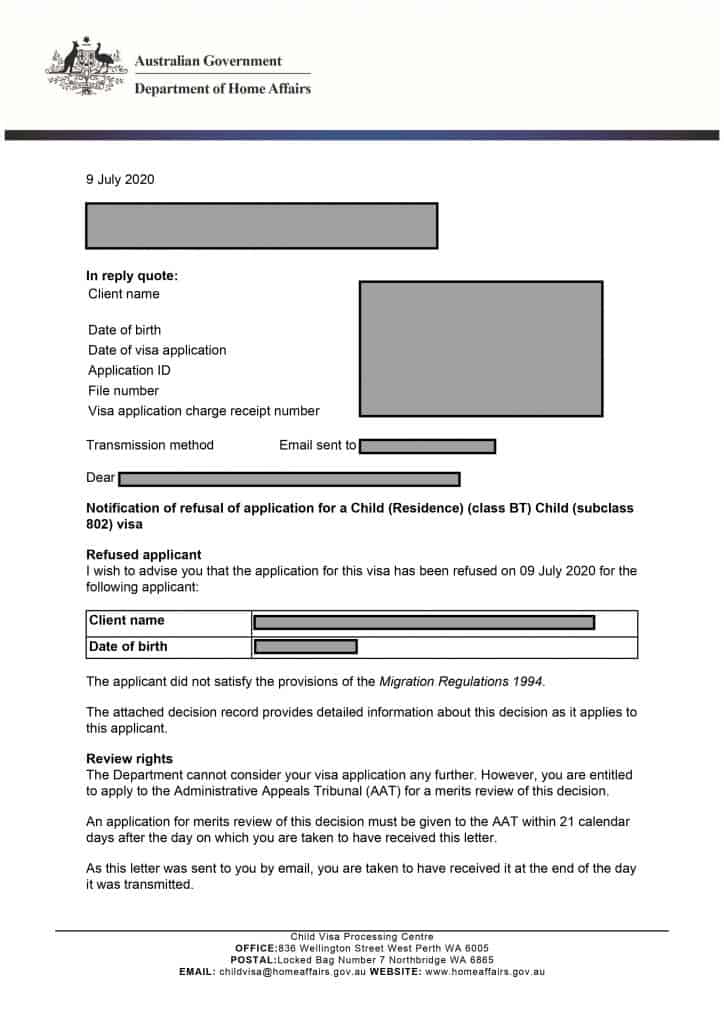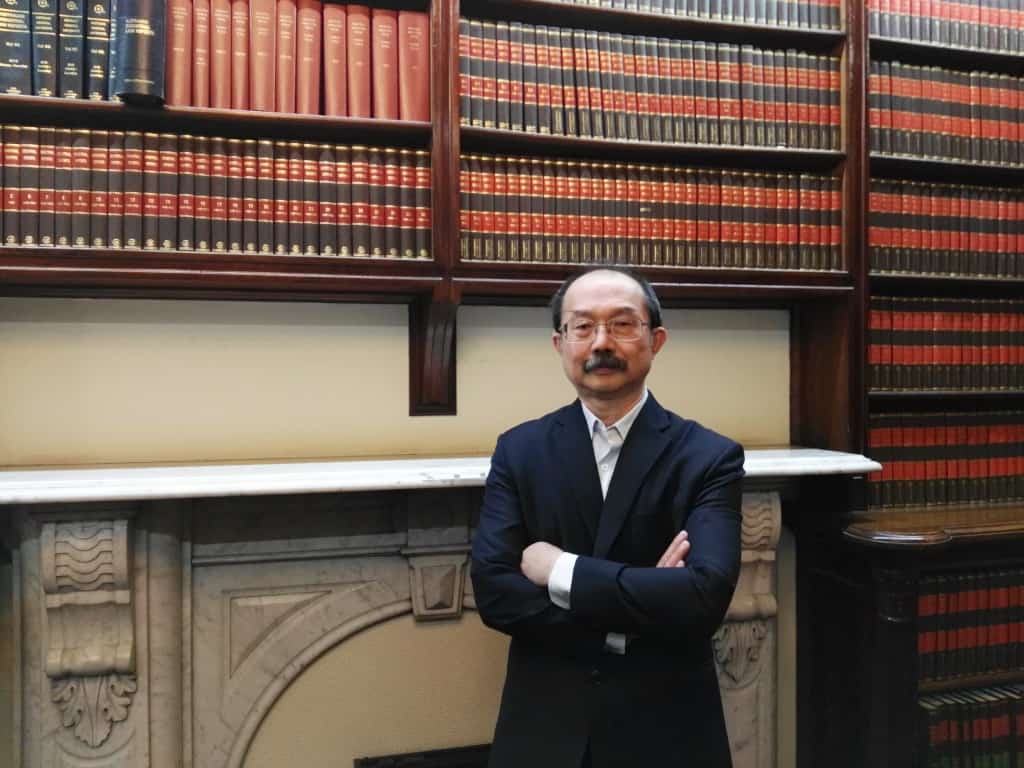
Child visa subclass 802 – tips on preventing visa refusal. These tips also apply to Subclass 101 (offshore child – click here to learn more).
There are a number of requirements for a child to meet the child visa subclass 802 (onshore – click here to learn more about applying for a subclass 802 visa) and Subclass 101 (offshore). Importantly, the child must be meet all of the below

3 very important child visa requirements
Tips on preventing child visa subclass 802 refusal
- a “dependent child” of an Australian citizen or PR or an eligible NZ citizen (sponsor). Dependent child can be a child or step-child of their sponsor who is not engaged to be married or has a spouse or de facto partner or never had a spouse or de facto partner; child is under 18 or if over 18 must be “dependent” on the sponsor or is unable to work due to the total or partial loss of the child’s bodily or mental functions (reg. 1.03). The child is “dependent” on the sponsor if they have been for a substantial period wholly or substantially reliant on the sponsor for financial support to meet their basic needs for foods, clothing and shelter (reg. 1.05A(1)(a)(i)); the child’s reliance on the sponsor is greater than any reliance on any other person, or source of support, for financial support to meet the child’s basic needs for food, clothing and shelter (reg. 1.05A(1)(a)(ii); or the child is wholly or substantially reliant on the sponsor for financial support because they are incapacitated for work due to total or partial loss of their bodily or mental functions (reg. 1.05A(1)(b)) click here to learn the precise meaning of “dependent”;
- the child must not be working full-time; and
- if 18 or over must within 6 months or a reasonable time after completing the equivalent of year 12 in the Australian school system, been undertaking a full-time course of study at an educational institution leading to the award of a professional, trade or vocational qualification. However, this does not apply if the child who, at the time of making the subclass 802 visa application, is a “dependent child” because they are incapacitated for work due to the total or partial loss of their bodily or mental functions.
Child is over 18 at the time of applying for child subclass 802 visa
If the child is over 18 at the time of applying for a child visa subclass 802 or subclass 101, they must meet certain requirements relating to relationship, work and study (cl. 802.224(2)(b). The child must continue to meet these requirements until a decision is made by the Department or the Tribunal.
Relationship status and history when applying for child subclass 802 visa
At the time of making the child subclass 802 visa, the child must not be engaged to be married, and must not have or ever have had a spouse or de facto partner (cl. 802.214(1)(a)). This condition must continue to be met at the time of decision (cl. 802.221(2)(b)).
Not engaged in full-time work
At the time of making the child subclass 802 visa, the child must not engage in full-time work (cl. 802.214(1)(b)). This condition must continue to be met at the time of decision (cl. 802.221(2)(b)).
Full-time study (or incapacitated for work)
At the time of making the child subclass 802 visa, the child must have, since turning 18, or within 6 months or a reasonable time after completing the equivalent of year 12 in the Australian school system, been studying a full-time course of study at an educational institution leading to the award of a professional, trade or vocational qualification (cl. 802.214(1)(c)). What this mean is that the child’s study must result in an award, for eg, a Diploma. The study cannot be for a hobby.
The child did not start to study within 6 months, the child must start to start within a “reasonable time”. What is a “reasonable time” depends on the surrounding circumstances including the actual time involved, what activities were undertaken during that time, the purpose for which those activities were undertaken and, if no relevant activities were undertaken, the reason why (Sok v MIMIA [2005] FMCA 190 at [19]).
A “reasonable time” only applies to the period between completing the equivalent of year 12 and commencing further studies. Examples of “reasonable time” given by the Court in Sok of circumstances that may justify a finding that periods of time beyond 6 months included:
- undertaking a one-year exchange student program in another country;
- living and working in another country;
- civil unrest interrupting studies;
- illness; and
- military service.
The Department’s policy gives examples of circumstances which may be considered reasonable including:
- if the break between completing studies in the Northern hemisphere and commencing studies in the Southern hemisphere is more than 6 months;
- a break due to giving birth;
- illness; or
- dire financial necessity; or
- if the child has commenced studies but moved between institutions and it has taken time to re-commence studies.
If you intend to use “dire financial necessity” to explain why the child has not commenced studies within 6 months, you will need to provide evidence that the child could not seek support from other family members or seek at least part-time employment in order to raise money for their studies (Taru (Migration) [2020] AATA 2717 (11 June 2020) at para 73).
The full-time study requirement will continue to apply until a decision is made (cl. 802.221(2)(b); Opoku-Ware v MIBP [2015] FCCA 1638; (2015) 297 FLR 416).
Australian migration law is complex and difficult to understand, contact our immigration lawyer for a consultation (fee applies) to help you prepare child subclass 802 visa application.

 041 222 4020 or WeChat: AUDvisa
041 222 4020 or WeChat: AUDvisa
This article is not intended to be or taken as migration legal advice. The author of this article disclaims any liability for any action or omission on the information provided or not provided in this article. You should always consult an immigration lawyer or a registered migration agent to form an informed opinion on your immigration matter.



